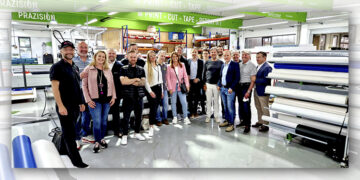Innovation. PILL GmbH Blackhole Process in Printed Circuit Board Production
Actions speak louder than words. So goes the proverb and so go the advances at Becker and Müller. In order to better meet increasing market demands, the printed circuit board manufacturer, based in Steinach im Kinzigtal near Offenburg, have invested in a new PILL unit for the Blackhole HT direct metallization process. This new production line enables the company to fulfill client requests at an even higher level of quality.
This optimized procedure for through-hole metallization is an investment in the company’s future. MacDermid, producer of the new direct metallization technology, first introduced “Blackhole HT” at the industry trade fair ‚Productronica‘ in November 2011 in Munich. Co-owners Michael Becker and Xaver Müller quickly recognized that the new Blackhole HT process would be perfectly suited to the requirements of their quick-turn prototype and small-batch production.
The Blackhole HT process is MacDermid’s response to the ever-increasing demands of printed circuit board technology. It allows for greater process control in the manufacture of all circuit board types, including PTFE-PCBs, and high-density multilayer PCBs with copper laminate – even those with copper innerlayers smaller than 18µm. Blackhole HT is an alkaline, carbon-based suspension with very low viscosity – comparable to water. The size of the carbon particles is around just 80-200 nanometers. Due to the low viscosity and minimal particle size, excellent carbon coverage is guaranteed – even in the smallest of pits, or over surface roughness which may result from the drilling process.
For the implementation of the Blackhole HT process, Becker & Müller selected a production system from PILL GmbH. Pill is known for tailoring their units to the needs of their customers. The strategic partnership between the Black Forest-based PCB-manufacturer and the renowned manufacturer from Auenwald is time-tested; the companies boast 22 years of continual cooperation and mutual confidence. Additional PILL machines can already be found on site in Steinach – from etching and pre- and post-cleaning units, to the photoresist and solder mask developer.
Planning and preparation for the Blackhole HT unit took place over a period of several months. Following the testing of the new unit at the PILL production facility, the 10-meter long unit was installed on site – a procedure which lasted 4 days. A team composed of members from each participating firm – Becker & Müller, PILL, MacDermid – accompanied the qualification and fine tuning of the unit’s test panels during initial trial runs. Dietmar Seifert, head of PILL, was also present during this final approval process: „The collaboration with the chemical supplier, the final adjustments, and the joint efforts of the team here on site increase the process quality of the product from day one.”
The horizontal, carbon-based, direct metallization process consists of 15 consecutive modules. From infeed to output module, the circuit boards run through every step of the process in just 20 minutes. Compared to conventional direct metallization processes with an electroless copper basis, the complete cycle run-time is reduced by up to 87%.
The most essential step takes place, naturally, in the BLACKHOLE MODULE. There, the circuit boards are bathed in the special MacDermid solution and undergo a surface treatment. A carbon suspension is applied through the holes, from above and below, covering the entire substrate surface including the innerlayers and creating a conductive surface coating.
In the subsequent Microclean module, the aim is to completely remove the carbon, while removing as little copper as possible, and, simultaneously, to produce a spotless surface which enables direct lamination with dry film.
A favorable side-effect of the direct metallization process is the decreased water consumption in comparison with conventional processes. This decrease, a result of the significant reduction in etching, can ultimately equal a savings of around 88%. The reduction in chemical consumption offered by the new PILL unit, due to the lower etching rate, is certainly a benefit as well – to both the environment and the bottom line.
The most record-breaking figure of all is perhaps the amount of time saved during start-up – a savings of 97% (!) is attained with the Black Hole HT-process. A PILL system utilizing this new technology can be started up quickly and requires very few laboratory analyses. The unit can thus essentially remain on standby around the clock. With this optimized process, the company can continue to offer its express service time of 6 hours (from receipt of order to delivery) with reliability. That is an excellent advantage in prototype production, which is the main focus at Becker & Müller.
And, indeed, the first results speak for themselves. The analyses, microsections, samples, and customer feedback have all been thoroughly positive thus far. Business has been going well for Becker & Müller in recent years and the company has continued to grow. „The slowdown expected by the industry will however come one day”, Xaver Müller and Michael Becker are certain of that. But these two businessmen can face that prospect with great ease. Thanks to diversification efforts and a wide customer base, they experienced expansion during even the last market downturn, when they were, for example, able to invest in a new company annex.
Becker & Müller look toward the future with optimism, and investment plans continue to be implemented. „We continue to invest in quality and service.” – A solid strategy for preventing crises. For instance, one of the next investments to be made will be a direct imaging machine which will further improve and optimize production.
Actions speak louder than words!





